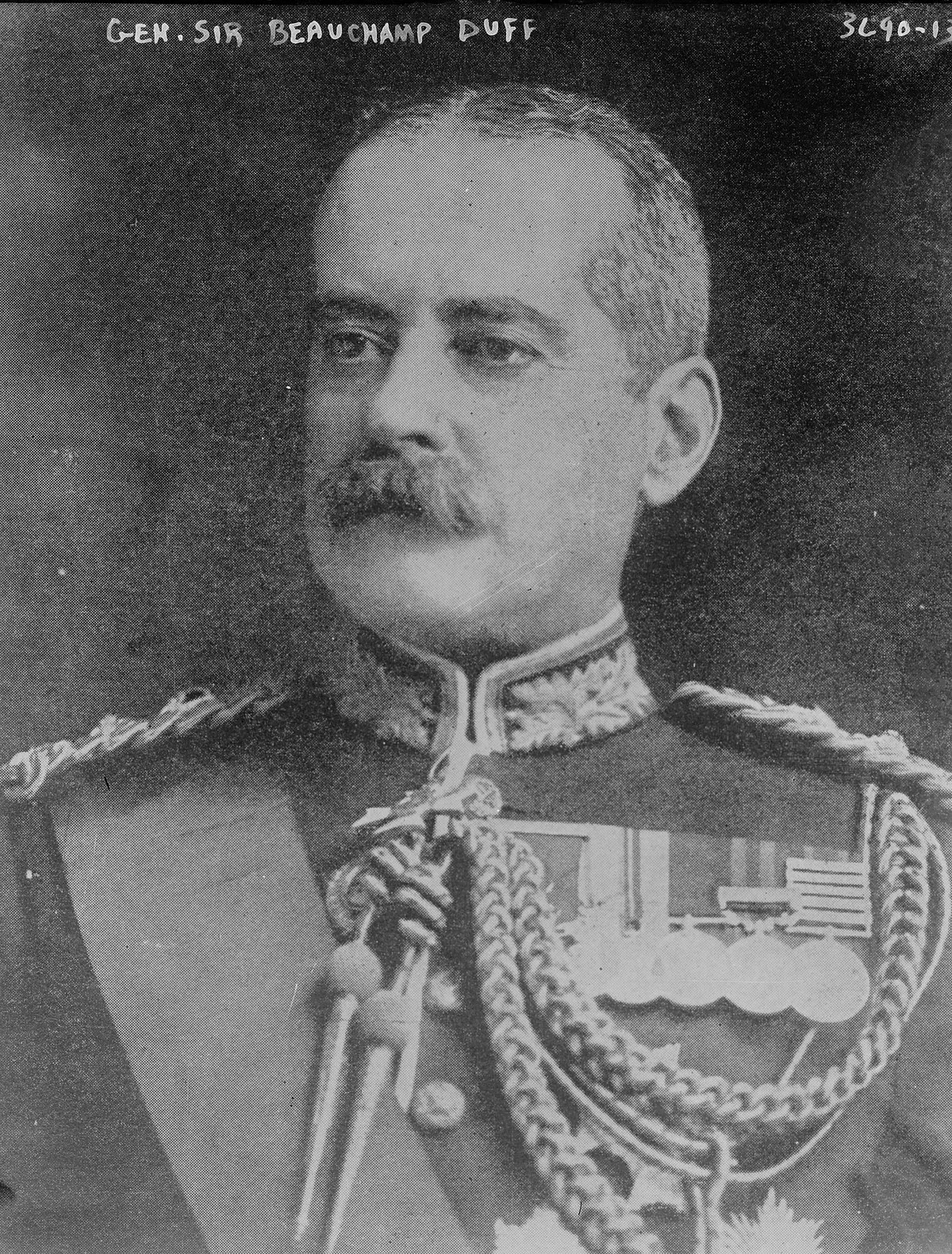 1.
1. Beauchamp Duff served as Commander-in-Chief of India during the First World War.

 1.
1. Beauchamp Duff served as Commander-in-Chief of India during the First World War.
Beauchamp Duff was educated at Trinity College, Glenalmond, before attending the Royal Military Academy, Woolwich, from which he graduated in 1874, and thence being commissioned straight into the Royal Artillery.
Two years later, Beauchamp Duff married Grace Maria, daughter of Oswald Wood of the Punjab Uncovenanted Civil Service.
Beauchamp Duff served with his regiment in the Second Anglo-Afghan War from 1878 to 1880, where he was with Lord Roberts at Cabul.
Beauchamp Duff attended the Staff College from 1887 to 1889, from which he passed out in first place; an immediate transfer followed to the staff in India as Military Attache.
Beauchamp Duff was Deputy Assistant Adjutant-General at the Indian Army Headquarters from 1891 to 1895, then served as a Brigade Major on the Isazai Expedition during 1892.
Beauchamp Duff was again Deputy Assistant Adjutant-General during the Waziristan Expedition from 1894 to 1895, fighting in the action at Wano, twice mentioned in despatches, he was promoted brevet lieutenant colonel.
From 1895 to 1899, Beauchamp Duff was Military Secretary to the Commander-in-Chief Sir George White in India, to Sir Charles Nairne and then to Sir William Lockhart, before being appointed Assistant Military Secretary for Indian Affairs in the War Office in 1899 to Lord Wolseley.
Beauchamp Duff was present at the sieges of Ladysmith, as well as at the actions at Elandslaagte and Rietfontein.
Beauchamp Duff served as Assistant Adjutant-General on Lord Roberts Staff during the actions at Vet River and Sand River, the surrender of Johannesberg, and then the subsequent occupation of Pretoria.
Beauchamp Duff was twice mentioned in despatches for the Boer War, was appointed a Companion of the Order of the Bath, and received the Queen's South Africa Medal with five clasps.
Beauchamp Duff was appointed in command of the Allahabad District with the rank of a brigadier general in early 1903.
Beauchamp Duff was then promoted to lieutenant general and, while serving as Chief of the General Staff in India from 1906 to 1909, he was required to file a secret memorandum on the deployment of forces in the event of Russia invading India.
Beauchamp Duff was appointed a Knight Commander of the Royal Victorian Order and, in 1907, a Knight Commander of the Order of the Bath.
On 22 October 1913, Beauchamp Duff succeeded General Sir O'Moore Creagh as Commander-in-Chief, India.
Beauchamp Duff's appointment was a change to normal practice as the post was usually held by a British Army officer rather one of the Indian Army.
Beauchamp Duff was replaced by General Sir Charles Monro in June 1917, but remained Colonel of the 9th Gurkha Rifles.
In 1914, Beauchamp Duff was appointed as ADC General to the King, and was in this significant political role when the First World War broke out on 4 August.
Indian Viceroy Lord Hardinge asked Beauchamp Duff to make a military assessment as to the feasibility of an operation in Mesopotamia.
Beauchamp Duff decided in short order that it was not possible.
Beauchamp Duff guessed that an occupying force would be at Baghdad for at least a fortnight before river transport could bring reinforcements.
Beauchamp Duff's conclusion was that Baghdad was of little military value.
Beauchamp Duff was determined that it was an Indian Army operation, advised by Sir Percy Lake, chief of staff, and GOC, Sir John Nixon there were adequate numbers of troops, 35,000 to carry out all operations.
Beauchamp Duff set the final date for a possible rescue attempt before the floods, agreed by Lake to be 15 March 1916.
Beauchamp Duff was reluctant to sack Lake telling Robertson that he was sure he "had his reasons," when Sir Percy finally went in July 1916.
Colonel Braddon in The Siege alleged that Duff had ordered returning officers and men to remain silent on their own experiences in captivity; that they lacked food, and sufficient medical attention for the blistering sun of 130 F He remained sanguine about these conflicting opinions.
The Viceroy had asked Beauchamp Duff to investigate the lack of supplies and provisions.
That was in December 1915, so when he embarked on another inquiry in February 1916 Beauchamp Duff was astutely aware of public opinion, investigating before being pushed by London.
Consequently, Beauchamp Duff was relieved of command on 1 October 1916.
Beauchamp Duff had declared Indian troops 'quite unfit for frontier work'.
Unable to live with the shame, Beauchamp Duff took to drink, committing suicide on 20 January 1918.